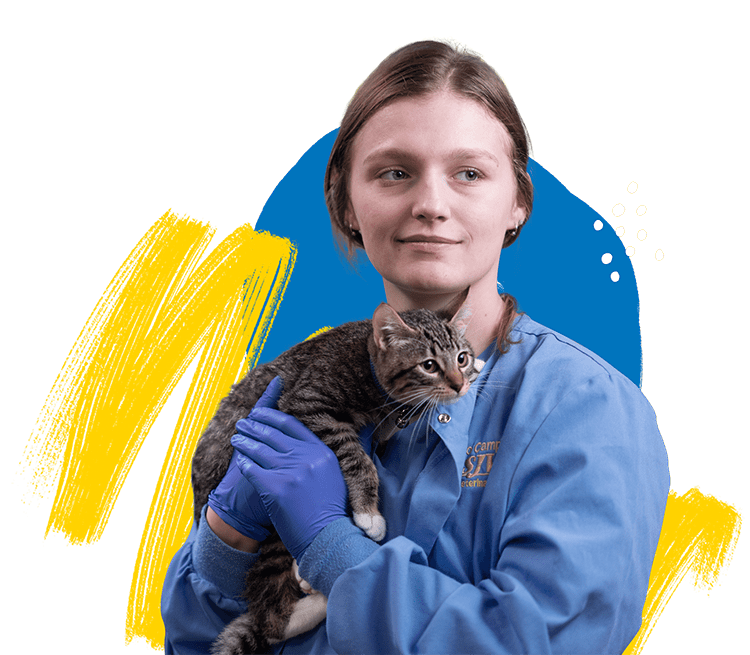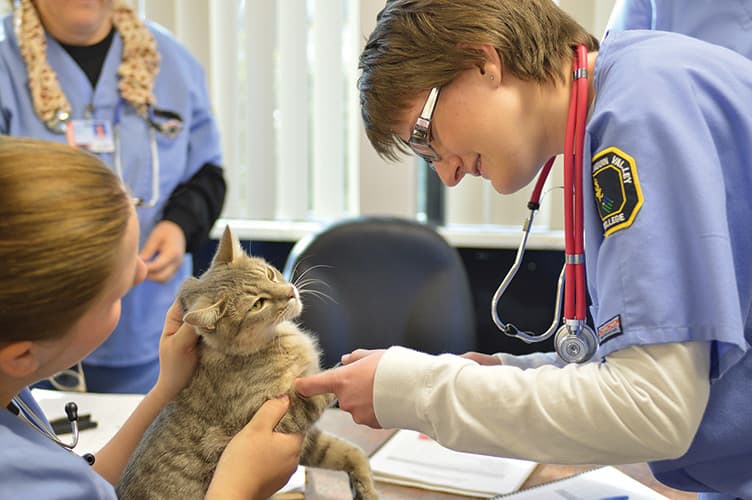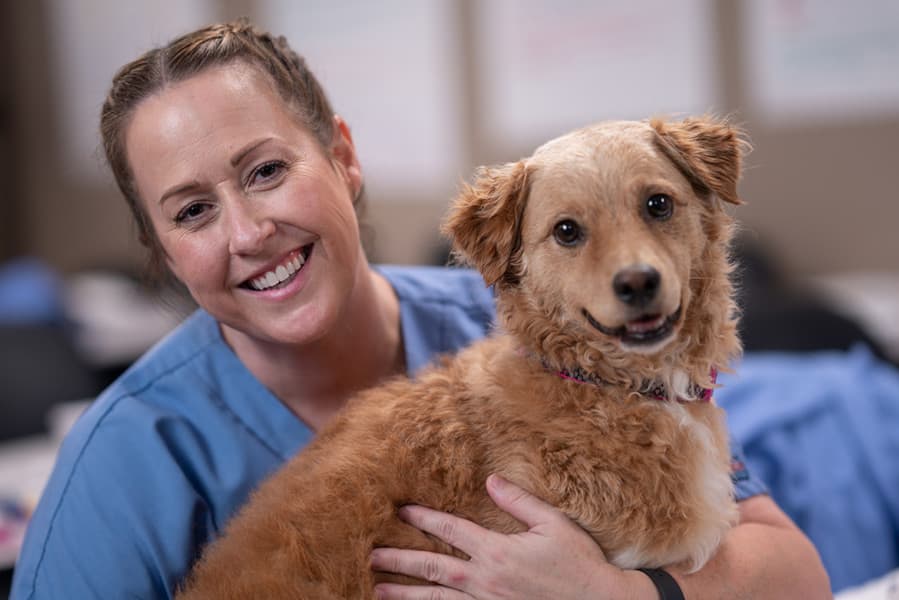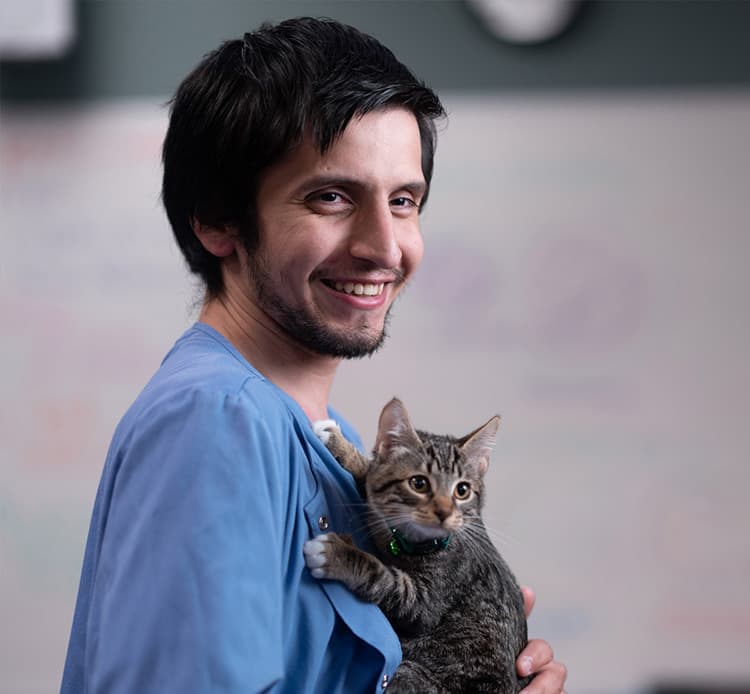Medical and Dental Programs
Veterinary Assistant
Students in SJVC’s Veterinary Assistant program learn how to provide support to veterinarians, as well as provide preventative, routine, emergency, and postoperative care to pets. Earn a certificate of completion in as few as 9 months.


Veterinary Assistant Program Details
WHAT WILL I LEARN?
Upon completion of this program, the successful student will be able to:
- Perform the duties pertaining to veterinary clinic reception, office management, and general computer skills
- Perform the various duties of a veterinary assistant, such as venipuncture, administering injections, placing IV catheters, and the monitoring anesthesia in a surgical setting
- Perform dental prophylaxis, with the capability to instruct and demonstrate in-home dental care, providing detailed explanations for future recommendations
- Apply the concepts of animal husbandry, common diseases, signs, treatment, and prevention of disease
- Perform and apply laboratory procedures, as well as radiographic film processing regarded as diagnostic contributions in animal health care
- Demonstrate confidence in the execution of exam room protocols, such as proper pet restraining techniques, obtaining vitals, accurate recording of patient history, and client communication within the examination process
- Relate and apply concepts of communication, reasoning, critical analysis, ethical behavior, and appropriate interpersonal interaction to situations in his or her career and personal life
- Demonstrate the social skills, professional appearance, attitudes, and behavior that employers expect of all SJVC graduates
Students receive hands-on training and participate in an externship. The externship includes various animal care environments to give students real-world experience.
COST & FINANCIAL AID
Education is the most important investment you can make in your future. There is a financial plan available for everyone, including a broad range of financial assistance options. Visit SJVC’s Net Price Calculator to get personalized information on college costs and financial aid. Check out SJVC’s Academic Catalog to learn about program costs by campus and credential level. You also can talk to an Admissions Advisor to discuss the costs of your chosen program and schedule an appointment with an experienced financial aid officer. Student loans, grants, and scholarships are available to those who qualify.
PROGRAM AVAILABILITY
SJVC’s Veterinary Assistant program is available at:
ACCREDITATION & APPROVALS
Institutional Accreditation
San Joaquin Valley College is accredited by the WASC Senior College and University Commission (WSCUC), 1080 Marina Village Parkway, Suite 500, Alameda, CA 94501, Phone: 510-748-9001, Fax: 510-748-9797.
The WSCUC is an institutional accrediting body recognized by the Council for Higher Education Accreditation and the U.S. Department of Education.
State Approvals
CALIFORNIA
SJVC is a private institution and is approved to operate as an accredited institution by the California Bureau of Private Postsecondary Education (BPPE). Approval to operate means that SJVC has been found in compliance with the standards set forth in the California Private Postsecondary Education Act of 2009 (as amended) and Title 5, Division 7.5, – Private Postsecondary Education of the California Code of Regulations. As a prospective student, you are encouraged to review this catalog prior to signing an enrollment agreement. You are also encouraged to review the School Performance Fact Sheet, which must be provided to you prior to signing an enrollment agreement.
A student or any member of the public may file a complaint about this institution with the Bureau for Private Postsecondary Education by calling (888) 370-7589 or by completing a complaint form, which can be obtained on the Bureau’s internet website (www.bppe.ca.gov).
Vet Assistant Classes
During the 36-week Veterinary Assistant program at SJVC, students will take veterinary assistant courses like the following.
- Introduction to Veterinary Assisting
- Introduction to Life Sciences
- Veterinary Anatomy & Physiology
- Animal Nursing
- Veterinary Pharmacology
- Veterinary Laboratory Procedures
- Veterinary Radiology
- Veterinary Surgical Assisting
- Veterinary Dentistry & Critical Care
Continuing Education for Graduates
Veterinary Assistant Studies
This program is offered through the Online Division.
Program Description
SJVC’s Veterinary Assistant Studies program may be completed in 25 weeks. The program is designed for veterinary professionals who want to advance their career and who have earned the Veterinary Assistant Certificate of Completion from San Joaquin Valley College. The Veterinary Assistant Studies Associate of Science degree affords excellent opportunities for professional growth and development through instruction in general education coursework designed to produce the competencies of higher education that employers expect of college graduates.
What Will I Learn?
Animal Nursing
Veterinary Laboratory Procedures
Veterinary Radiology
Veterinary Dentistry & Critical Care
Ready to Do This?
Find your path as a Veterinary Assistant
Talk to an admissions advisor about your options and earn your certificate in as few as 9 months.
Veterinary Assistant Career Opportunities
Veterinary assistants and laboratory animal caretakers typically work under the supervision of veterinarians and veterinary technologists and technicians. They perform routine animal care tasks. Their duties may include:1
- Feed, bathe, and exercise animals
- Clean and disinfect cages, kennels, and examination and operating rooms
- Restrain animals during examination and laboratory procedures
- Maintain and sterilize surgical instruments and equipment
- Monitor and care for animals after surgery
- Help provide emergency first aid to sick and injured animals
- Give medication or immunizations that veterinarians prescribe
- Assist in collecting blood, urine, and tissue samples
Veterinary assistants may also perform animal intake sessions before a pet owner meets with a veterinarian. In addition to being adept at performing animal care effectively, vet assistants must also be good at communication and show empathy and understanding to pet owners they meet with.

Check out our guide on Veterinary Assisting
Veterinary assistants play an important role in ensuring the well-being of animals who visit veterinary offices. Veterinary assistants help veterinarians and veterinary technologists and technicians treat injuries and illnesses of animals.
If you have a love for animals, a career as a veterinary assistant can be rewarding. You can play a direct role in helping animals maintain health and well-being and in providing comfort and happiness to their owners. Learn how to become a vet assistant and what to expect from this important job in this guide.

Successful Grads
Ask one of our graduates about their SJVC experience and they’ll likely describe it as life-changing.
Request Information
All fields using an asterik (*) are required.
Veterinary Assistant FAQ
How long does it take to train a vet assistant?
Do I need to be certified as a vet assistant?
How do I get a vet assistant certificate?
- Obtaining a vet assistant certificate means you will attend a qualified Veterinary Assistant program. Check with an admissions advisor for specific admissions requirements. Before earning your certificate, you will likely take courses in:
- Veterinary Anatomy & Physiology
- Animal Nursing
- Veterinary Radiology
- Veterinary Dentistry & Critical Care
- Veterinary Laboratory Procedures
What does a vet assistant do?
- Vet assistants work with animals under the supervision of veterinarians and veterinary technicians. Veterinary assistants and laboratory animal caretakers typically do the following:1
- Feed, bathe, and exercise animals
- Clean and disinfect cages, kennels, and examination and operating rooms
- Restrain animals during examination and laboratory procedures
- Maintain and sterilize surgical instruments and equipment
- Monitor and care for animals after surgery
- Help provide emergency first aid to sick and injured animals
- Give medication or immunizations that veterinarians prescribe
- Assist in collecting blood, urine, and tissue samples